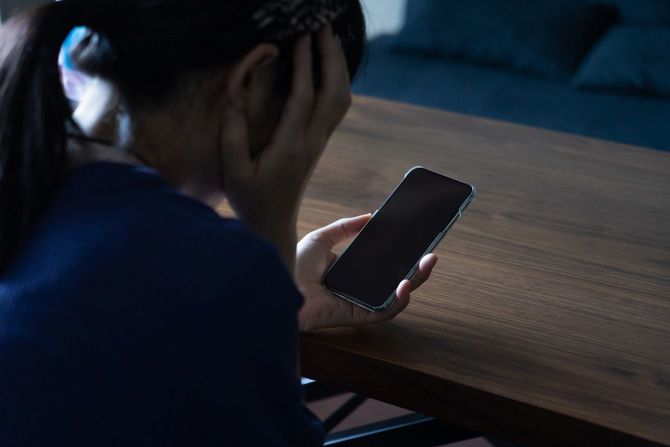人と一緒に過ごすことが逆効果に
バッファー仮説と増幅仮説の2つのうち、どちらが実態に近いのでしょうか。
スタヴロワ准教授らの研究ではドイツのデータを使い、実際に分析を行った結果、増幅仮説のほうが妥当であることを明らかにしました。一人でいるときよりも、他の人と一緒にいるときのほうが孤独のマイナスの影響はより大きかったのです。
また、分析の結果、孤独を強く感じている人ほど、他人と一緒にいることが幸福に結びつかないことも明らかにしています。孤独を強く感じている人にとって、他人といることがプラスになるわけではないのです。
以上の分析結果は、他の人と一緒に時間を過ごすだけでは、孤独感の負担が軽減されるわけではなく、逆効果になる可能性があることを示しています。
孤独・孤立の解消は一筋縄ではいかない
孤独・孤立化は、私たちの社会の直面する新しい問題です。この問題への解決策として、人とのふれあいを増やすという方法が真っ先に思いつきますが、状況によっては逆効果になる恐れもあります。
実は孤独を解消するためにどのような対応すればいいのかを調査した研究でも、人と触れ合う機会を増やすことが必ずしも最適な方法ではないと指摘されています(*12)。
その研究では、最も効果的な方法として、孤独を感じている人の考え方を修正・改善させるほうが望ましいと述べています。孤独感を抱いている人は、他人が自分をどのように見ているかについて否定的な考えを持ちがちです。また、どうしても自分に自信が持てず、他人との交流を怖いものと認識してしまう傾向があります。
これらの否定的な考えを修正・改善させ、社会や自分に対する認識を変えることが孤独から抜け出す方法として望ましいというわけです。孤独・孤立からの脱却は、私たちが思っている以上に一筋縄ではいかないものであり、その対応には慎重を期すべきでしょう。
(*1)Holt-Lunstad J, Smith TB, Layton JB. (2010). Social relationships and mortality risk: a meta-analytic review. PLoS Med, 27;7(7): e1000316.
(*2)Uchino, B. N. (2006). Social support and health: a review of physiological processes potentially underlying links to disease outcomes. Journal of Behavioral Medicine, 29(4), 377–87.
(*3)Valtorta NK, Kanaan M, Gilbody S, Ronzi S, Hanratty B. (2016). Loneliness and social isolation as risk factors for coronary heart disease and stroke: systematic review and meta-analysis of longitudinal observational studies, 1;102(13), 1009–16.
(*4)Stavrova, O., Ren, D. (2023). Alone in a Crowd: Is Social Contact Associated with Less Psychological Pain of Loneliness in Everyday Life? Journal of Happiness Studies, 24, 1841–1860.
(*5)Lucas, R. E., & Dyrenforth, P. S. (2006). Does the existence of social relationships matter for subjective well-being? In K. D. Vohs, & E. J. Finkel (Eds.), Self and relationships: Connecting intrapersonal and interpersonal processes (pp. 254–273). Guilford Press.
(*6)Stavrova, O., & Ren, D. (2020). Is more always better? Examining the nonlinear association of social contact frequency with physical health and longevity. Social Psychological and Personality Science, 12(6), 1058–1070.
(*7)Hawkley, L., Preacher, K., & Cacioppo, J. (2007). Multilevel modeling of social interactions and mood in lonely and socially connected individuals: The MacArthur Social Neuroscience Studies. Oxford Handbook of Methods in Positive Psychology.
(*8)Vanhalst, J., Soenens, B., Luyckx, K., Van Petegem, S., Weeks, M. S., & Asher, S. R. (2015). Why do the lonely stay lonely? Chronically lonely adolescents’ attributions and emotions in situations of social inclusion and exclusion. Journal of Personality and Social Psychology, 109(5), 932–948.
(*9)Rotenberg, K. J. (1994). Loneliness and interpersonal trust. Journal of Social and Clinical Psychology, 13(2), 152–173.
(*10)Cacioppo, J. T., Hawkley, L. C., & Thisted, R. A. (2010). Perceived social isolation makes me sad: 5-year cross-lagged analyses of loneliness and depressive symptomatology in the Chicago Health, Aging, and Social Relations Study. Psychology and Aging, 25(2), 453–463.
(*11)Lau, S., & Gruen, G. E. (1992). The Social Stigma of loneliness: Effect of Target Person’s and Perceiver’s sex. Personality and Social Psychology Bulletin, 18(2), 182–189.
(*12)Masi, C. M., Chen, H. Y., Hawkley, L. C., & Cacioppo, J. T. (2011). A meta-analysis of interventions to reduce loneliness. Personality and Social Psychology Review, 15(3), 219–266.





